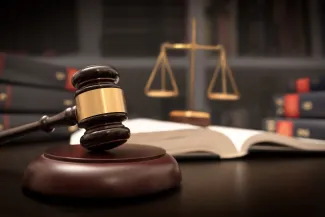
Appeals court hears arguments in suit over ‘respectful’ speech rules at Colorado legislature
A federal appeals court heard oral arguments Wednesday in a case challenging the ability of Colorado legislators to require respectful speech during legislative hearings.
The initial lawsuit, filed last year in the U.S. District Court of Colorado, claimed the state legislators named as defendants violated the plaintiffs’ right to free speech by stopping them from misgendering and deadnaming transgender people during their testimony in a legislative committee hearing.
The plaintiffs in the lawsuit, Rich Guggenheim and Christina Goeke, seek damages and for the court to block enforcement of decorum rules around respectful language in committee hearings at the Colorado General Assembly.

© fotoguy22 - iStock - 1468912821
In March 2024, they both testified against House Bill 24-1071, which added gender-affirming care to the definition of good cause for when a person convicted of a felony petitions to change their legal name. During their testimony, Guggenheim and Goeke repeatedly misgendered and deadnamed Tiara Latrice Kelley, a transgender woman for whom the law was named.
The plaintiffs opposed the bill because they believe “it will make it easier for transgender individuals to conceal criminal convictions and thus pose a danger to children, women, and vulnerable populations,” the initial complaint says.
Judge Regina Rodriguez dismissed the case in November 2024, concluding that the legislators’ actions were “within the sphere of legitimate legislative activity” and that the plaintiff’s claims are moot because the bills they testified on already passed and became law, and the decorum rules and restrictions they challenged were set specifically for testimony on that law.
“Plaintiffs have not pointed to any ‘continuing, present adverse effects’ beyond speculation that there will potentially be future bills that implicate transgender concerns, that Plaintiffs will likely want to testify on these potential bills, and that the same decorum rules and restrictions may be put in place for any public testimony hearings on these potential bills,” Rodriguez wrote in her order.
The plaintiffs, who are represented by attorneys from the conservative Institute for Free Speech, appealed Rodriguez’s order to the 10th Circuit Court of Appeals, where a panel of three judges heard the case Wednesday.

Endel Kolde, attorney for the plaintiffs, said the state legislators discriminated against and censored the plaintiffs based on their viewpoints. He argued deadnaming and misgendering should be permitted if they are done in relation to substantive argument about legislation, to which Judge Joel Carson responded, “Isn’t that really hard for courts to police?”
Kolde also argued that legislative immunity does not apply to this case, and saying it does would allow legislative bodies to censor anyone they disagree with.
Edward Ramey, attorney for the defendants, said legislative immunity is the “primary defense” in the case, as the limitations the state legislators set were for “legitimate legislative activity.” He said it is up to the legislators overseeing legislative hearings what rules they want to set for their committee hearings.
Rules for public testimony in both the Colorado House and Senate note that a committee chair has the discretion to limit testimony and ask for disruptive people to be removed. Legislative hearings are limited public forums, which means the discussion can be confined to a certain topic and must follow the rules set ahead of time.
Legislators named in the lawsuit include state Senator Mike Weissman, an Aurora Democrat who previously chaired the House Judiciary Committee; Representative Lorena Garcia, an Adam County Democrat; former Representative Leslie Herod, a Denver Democrat; state Senator Julie Gonzales, a Denver Democrat who chairs the Senate Judiciary Committee; and Senator Dafna Michaelson Jenet, a Commerce City Democrat.

















